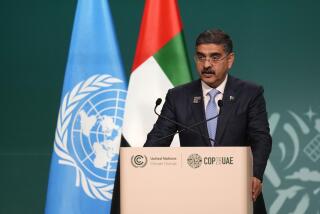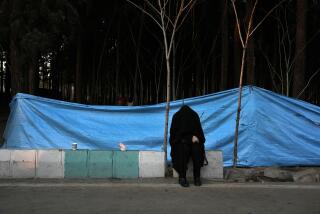Militant group claims Iran suicide bombings
- Share via
Reporting from Beirut and Tehran — An Islamic militant group whose leader was recently executed by Iranian authorities claimed responsibility Friday for a devastating pair of bomb blasts the previous night that killed at least 27 people, including members of the elite Revolutionary Guard, and injured 270 others at a mosque in southeastern Iran.
Jundallah, a Sunni organization that draws support from Iran’s ethnic Baluch minority and inspiration from Osama bin Laden’s extremist ideology, said it dispatched two suicide bombers to the mosque in the city of Zahedan during an evening prayer ceremony. The group said its goal was to kill members of the Revolutionary Guard and avenge the arrest and hanging last month of its leader, Abdulmalak Rigi.
“This operation is a response to incessant crimes of the regime in Baluchistan,” the group said in a statement, referring to a region that straddles corners of Iran, Afghanistan and Pakistan. “The two young martyrs sacrificed their lives and shattered the dreams of executioners and devils.”
The bombing by the group, which Iranian officials describe as a tool of Western intelligence, could have broader ramifications. A deadly Oct. 18 Jundallah blast targeting Revolutionary Guard members at a different mosque in Zahedan may have contributed to the collapse of an American-backed deal to exchange Iran’s nuclear fuel for plates to power a Tehran medical reactor, analysts say.
The West is again awaiting Iran’s possible return to a new round of negotiations after the imposition of fresh sanctions against Tehran for its nuclear research program, which the West suspects is aimed at producing weapons.
Iranian officials contend that Jundallah is backed by the United States, citing televised confessions Rigi made during his detention. On Friday, Iranian politicians blamed the U.S., Britain and Israel for Thursday’s terrorist attack, even though Secretary of State Hillary Rodham Clinton had strongly condemned what she described as a “horrific” act of terrorism.
“The United States condemns all forms of terrorism and sectarian-driven violence, wherever it occurs, and stands with the victims of these appalling acts,” Clinton said in a statement released late Thursday. “This attack, along with the recent attacks in Uganda, Pakistan, Afghanistan, Iraq and Algeria, underscores the global community’s need to work together to combat terrorist organizations that threaten the lives of innocent civilians all around the world.”
The double-pronged attack, designed to inflict maximum casualties, resembled strikes by Sunni militants against Shiites in Iraq and Pakistan.
According to Jundallah’s statement and Iranian news agencies, the first suicide bomber, possibly dressed as a woman, tried unsuccessfully to enter the mosque before blowing himself up, killing and injuring several people. A second suicide bomber blew himself up 15 minutes later amid a crowd of bystanders and rescue workers attending to the first victims, killing and wounding many more.
A Zahedan-based journalist, Adel Mazari, said 150 of the 270 wounded were severely injured and remained hospitalized Friday. The attack coincided with a religious commemoration marking the birth of Imam Hussein, the prophet Muhammad’s grandson and a revered figure in the Shiite faith.
The statement by Jundallah named the suicide bombers as Mohammad Rigi and Abdolbasset Rigi, both members of the late leader’s clan.
Ethnic Baluchis are mostly Sunni Muslims, whereas nearly 90% of Iranians are members of the Shiite sect of Islam. An Iranian official and Mazari said the attack had enraged the local population. After the blasts, locals stormed a business district and a residential area believed to belong to Sunnis but police quickly established order, Mazari said.
“People have been severely affected and they are complaining against the government,” lawmaker Hossein-Ali Shahriari told the semiofficial Iranian Labor News Agency.
Times staff writer Daragahi reported from Beirut and special correspondent Mostaghim from Tehran.
More to Read
Sign up for Essential California
The most important California stories and recommendations in your inbox every morning.
You may occasionally receive promotional content from the Los Angeles Times.













